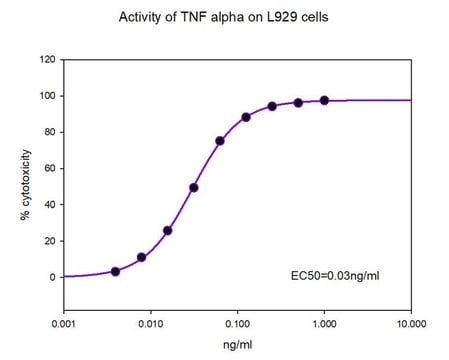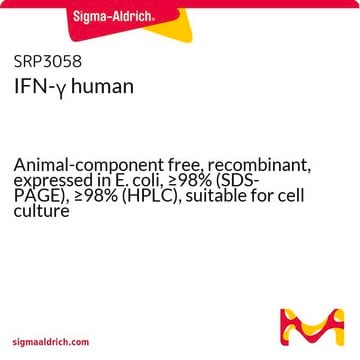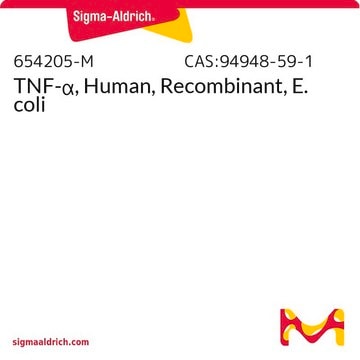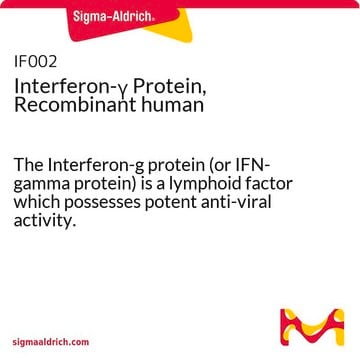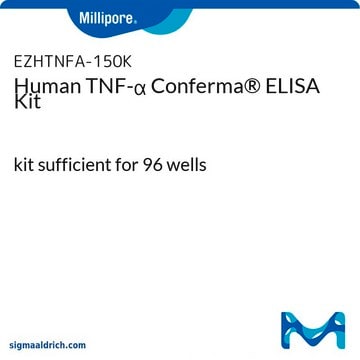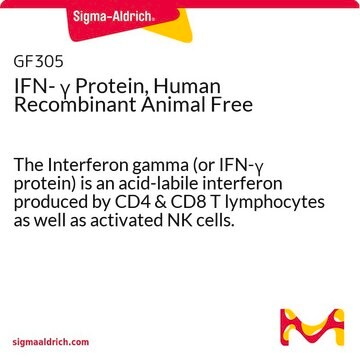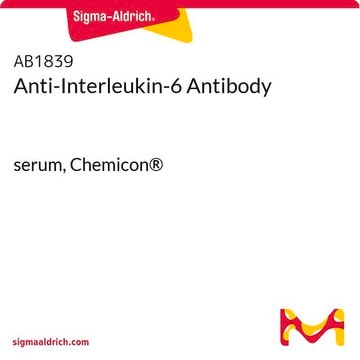GF314
TNF- α Protein, Human Recombinant Animal Free
Tumor necrosis factor alpha (TNF-α), also known as cachectin & TNFSF1A, is the prototypic ligand of the TNF superfamily. Recombinant animal free human TNF-α is manufactured using all non-animal reagents.
Synonym(e):
Tumor Necrosis Factor Alpha, TNFa, TNF-alpha, Cachectin, TNFSF1A
Anmeldenzur Ansicht organisationsspezifischer und vertraglich vereinbarter Preise
Alle Fotos(1)
About This Item
UNSPSC-Code:
12352202
eCl@ss:
32160405
NACRES:
NA.77
Empfohlene Produkte
Rekombinant
expressed in E. coli
Qualitätsniveau
Assay
>98% (SDS-PAGE and HPLC)
Verunreinigungen
<0.1 μg/mg protein endotoxin (<1EU/μg)
NCBI-Hinterlegungsnummer
UniProt-Hinterlegungsnummer
Versandbedingung
dry ice
Allgemeine Beschreibung
Product Source: E. coli
Tumor necrosis factor alpha (TNF-α), also known as cachectin and TNFSF1A, is the prototypic ligand of the TNF superfamily. It is a pleiotropic molecule that plays a central role in inflammation, apoptosis, and immune system development. TNF-α is produced by a wide variety of immune and epithelial cell types. It belongs to the TNF family of ligands and signals through two receptors, TNFR1 and TNFR2. TNF-α is cytotoxic to a wide variety of tumor cells and is an essential factor in mediating the immune response against bacterial infections. TNF-α also plays a role in the induction of septic shock, auto immune diseases, rheumatoid arthritis, inflammation, and diabetes. Recombinant human TNF-α is a soluble 157 amino acid protein (17.4 kDa) which corresponds to C-terminal extracellular domain of the full length transmembrane protein.
Spezifität
Cross Reactivty
Cow, Monkey, Mouse, Rat, Sheep
Cow, Monkey, Mouse, Rat, Sheep
Anwendung
Research Category
Entzündung & Immunologie
Entzündung & Immunologie
Research Sub Category
Wachstumsfaktoren & -rezeptoren
Wachstumsfaktoren & -rezeptoren
Qualität
Bioactivity assay: The ED50 as determined by the cytolysis of murine L929 cells in the presence of Actinomyocin D is ≤ 0.05 ng/ml, corresponding to a specific activity of ≥2 x 107 units/mg.
Physikalische Form
Product is filtered through a 0.2 micron filter before lyophilization.
Recombinant animal free human TNF- α is manufactured using all non-animal reagents
Lagerung und Haltbarkeit
Store at -20°C for up to 6 months from date of receipt.
Haftungsausschluss
Unless otherwise stated in our catalog or other company documentation accompanying the product(s), our products are intended for research use only and are not to be used for any other purpose, which includes but is not limited to, unauthorized commercial uses, in vitro diagnostic uses, ex vivo or in vivo therapeutic uses or any type of consumption or application to humans or animals.
Lagerklassenschlüssel
11 - Combustible Solids
WGK
WGK 3
Analysenzertifikate (COA)
Suchen Sie nach Analysenzertifikate (COA), indem Sie die Lot-/Chargennummer des Produkts eingeben. Lot- und Chargennummern sind auf dem Produktetikett hinter den Wörtern ‘Lot’ oder ‘Batch’ (Lot oder Charge) zu finden.
Besitzen Sie dieses Produkt bereits?
In der Dokumentenbibliothek finden Sie die Dokumentation zu den Produkten, die Sie kürzlich erworben haben.
Kunden haben sich ebenfalls angesehen
Bjarne Østerud et al.
Journal of thrombosis and haemostasis : JTH, 20(4), 866-876 (2021-11-26)
Most tissue factor (TF) activity assays are based on measurement of factor X (FX) activation by TF in the presence of factor VII (FVII)/FVIIa. This requires long incubation, which may result in TF-independent activity of FX and inaccurate measurement of
Toll-like receptor 9 (TLR9) gene deletion-mediated fracture healing in type II diabetic osteoporosis associates with inhibition of the nuclear factor-kappa B (NF-I?B) signaling pathway.
Han, et al.
Bioengineered, 13, 13689-13702 (2022)
Ruo-Yu Chen et al.
Cell death & disease, 12(11), 983-983 (2021-10-24)
Chronic and persistent inflammation is a well-known carcinogenesis promoter. Hepatocellular carcinoma (HCC) is one of the most common inflammation-associated cancers; most HCCs arise in the setting of chronic inflammation and hepatic injury. Both NF-κB and STAT3 are important regulators of
Zhihua Ye et al.
Cell death & disease, 13(7), 633-633 (2022-07-22)
Uncontrolled growth, distant metastasis and chemoresistance are critical characteristics of pancreatic ductal adenocarcinoma (PDAC), and they result in high mortality; however, the mechanisms triggering these effects have not been fully investigated. In this study, we analysed a dataset in the
Ruo-Yu Chen et al.
Cell death and differentiation, 27(4), 1259-1273 (2019-09-13)
Centrosomal P4.1-associated protein (CPAP) is overexpressed in hepatocellular carcinoma (HCC) and positively correlated with recurrence and vascular invasion. Here, we found that CPAP plays an important role in HCC malignancies. Functional characterization indicated that CPAP overexpression increases tumor growth, angiogenesis
Unser Team von Wissenschaftlern verfügt über Erfahrung in allen Forschungsbereichen einschließlich Life Science, Materialwissenschaften, chemischer Synthese, Chromatographie, Analytik und vielen mehr..
Setzen Sie sich mit dem technischen Dienst in Verbindung.